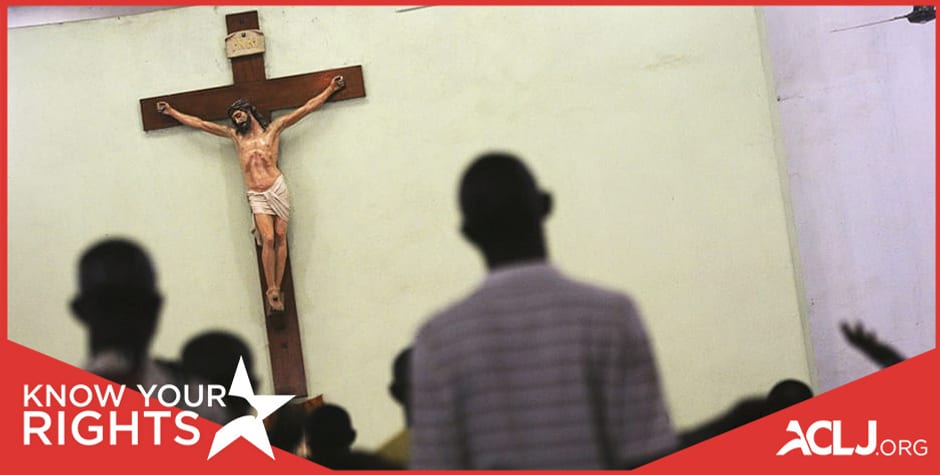Know Your Rights: Protecting International Religious Freedom
Most people are very familiar with the domestic religious freedom work of the ACLJ. However, many may not be as familiar with our global work with international bodies in defense of persecuted Christians and human rights.
Internationally, religious freedom is a protected right, though it is not always implemented and enforced, and that’s where we come in. As we explain in our memo, “International Human Rights & Religious Liberty,” the U.N. and the nations that comprise it have agreed to protect religious liberty through a series of treaties and other international agreements, including:
the Universal Declaration of Human Rights (UDHR), the International Covenant on Civil and Political Rights (ICCPR), and the International Covenant on Economic, Social and Cultural Rights (ICESCR). Together, these three documents are often referred to as the “International Bill of Rights.”
Article 18 of the UDHR states that “[e]veryone has the right to freedom of thought, conscience and religion,” including the freedom to convert, to worship either alone or with others, and to generally manifest one’s belief in teaching, practicing, and observing. Also relevant to religious liberty is Article 19’s guarantee of freedom of expression and Article 20’s guarantee of the right to peaceful assembly and association.
Articles 18 and 19 of the ICCPR largely mimic the wording of the UDHR, but expound on the very limited reasons for which governments may restrict religious freedom and expression, such as national security or public health and order. The ICESCR adds specific prohibitions on religiously-based discrimination.
The enforcement of these rights often involves legal work in a number of international bodies. In 2007 our international affiliate, the ECLJ (European Centre for Law and Justice, located in Strasbourg, France), was granted special consultative status before the United Nations/ECOSOC (Economic and Social Council). To be granted this status, an organization must possess special competence in a specific field or fields – ours, of course, being religious liberty and human rights. The special consultative status allows access to the U.N. to attend meetings, submit written reports, make oral interventions, meet with government delegations, and more. We have not taken this responsibility lightly. Since 2007, we have been consistently engaging, making submissions, attending meetings, and providing oral interventions addressing religious freedom and human rights issues around the world.
There are also several working groups within the U.N. with which we engage on a frequent basis. One of those is the Working Group on Arbitrary Detention (WGAD). This group reviews cases of individuals who have been arbitrarily detained, which encompasses many religious persecution cases where Christians have been targeted, falsely accused, and detained solely based on their religion. The WGAD reviews these cases and publishes opinions regarding the same. We have been successful in our engagement with the WGAD and have received favorable opinions. These opinions request that the offending country remedy the situation, typically by releasing the detainee and affording compensation. Although the WGAD does not have enforcement authority, such opinions are very helpful in bringing these injustices to light, not only to the offending country, but also the world.
Our engagement with international bodies is not just limited to the U.N. We are also very engaged with the European Court of Human Rights (ECtHR), which is authorized under the Council of Europe (COE). It is located in Strasbourg, France, where our ECLJ office is located. We also interact with the European Union and Organization for Security and Cooperation in Europe (OSCE) on a regular basis. Our director of the ECLJ has even served on the Panel of Experts of the OSCE Office for Democratic Institutions and Human Rights (ODIHR) on Freedom of Religion or Belief. We have also engaged with the Inter-American Court of Human Rights under the Organization of American States (OAS). We are intentionally engaged in all of the bodies to make sure that religious liberty and human rights are valued and protected.
It is our hope that the accompanying White Paper will help provide an international human rights law 101 overview. The ACLJ is dedicated to defending your religious freedom across the globe. We have been providing assistance and legal representation, at no cost or charge, to people just like you all over the world for decades. If your rights are being violated in this area, please contact us at ACLJ.org/HELP.
Learn more about your rights at ACLJ.org/Know-Your-Rights.
